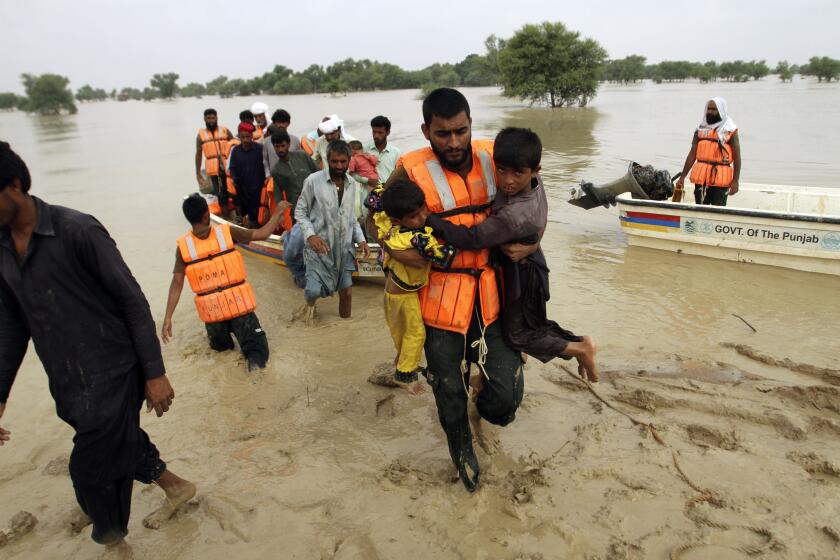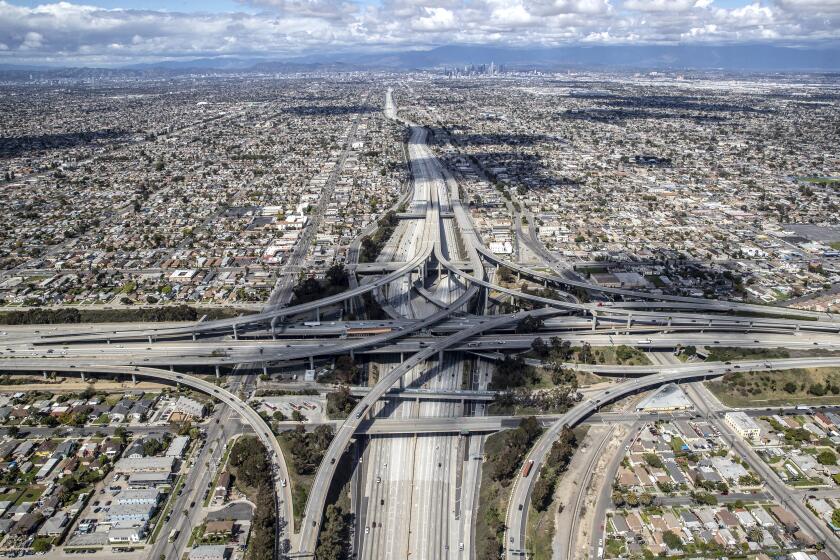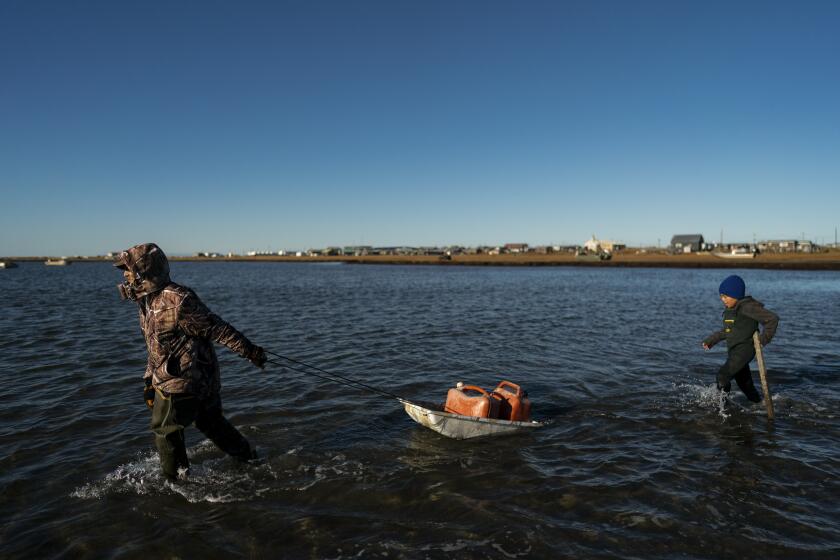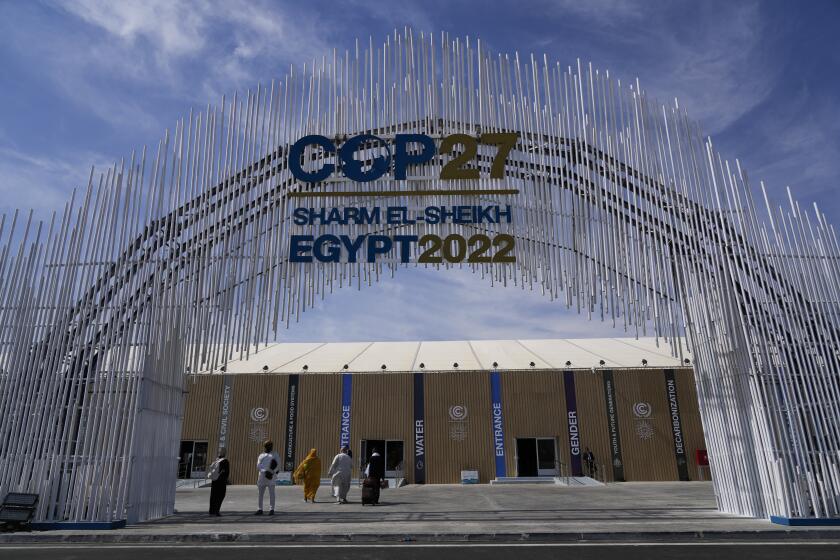U.N. chief, Al Gore and others give dire warnings at global climate conference
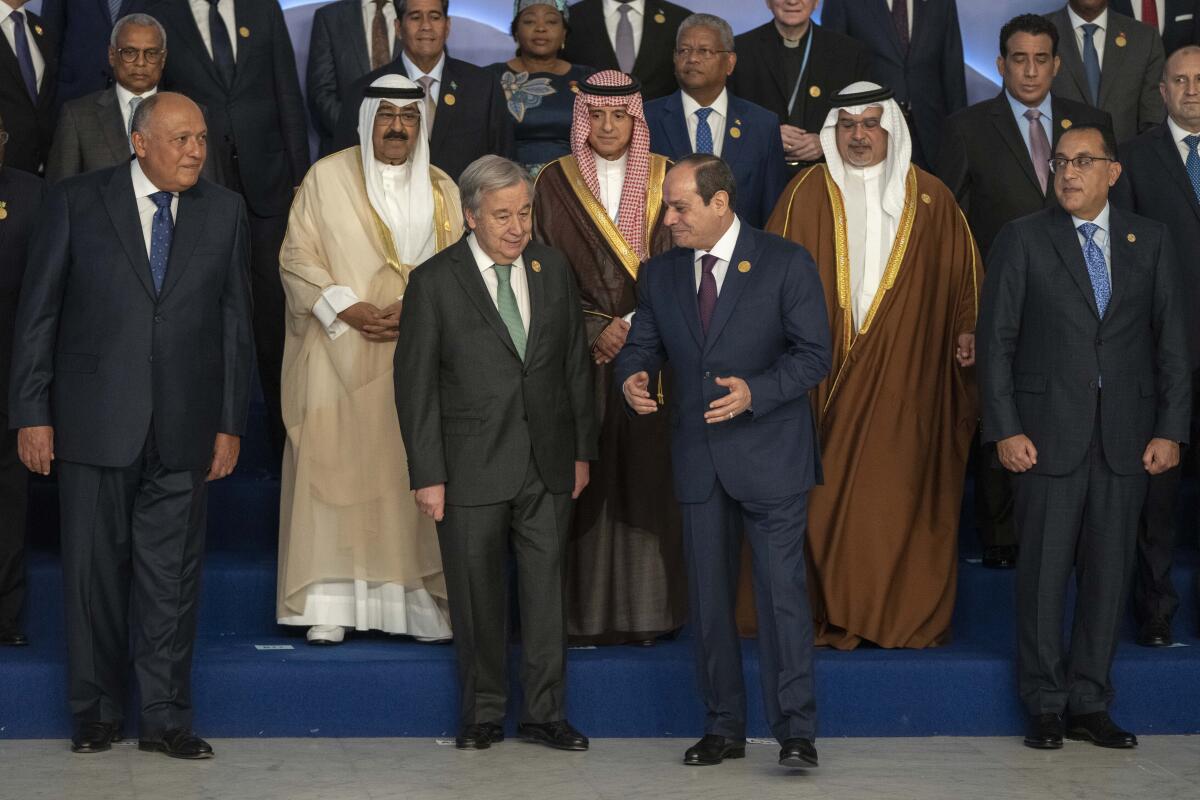
- Share via
SHARM EL SHEIKH, Egypt — With the world on “a highway to climate hell with our foot on the accelerator,” the United Nations chief on Monday told dozens of leaders to “cooperate or perish” on avoiding further climate catastrophe, singling out the two biggest polluting countries, China and the United States.
U.N. Secretary-General Antonio Guterres was not the only one preaching with tones of fire and brimstone, invoking pathos and tragedy and trying to shake up the world’s sense of urgency at this year’s annual U.N. climate conference.
“Choose life over death,” former U.S. Vice President Al Gore declared. “It is not time for moral cowardice.”
Some of the strongest pleas for action came from leaders of poor nations that caused little of the pollution but often get a larger share of the weather-related damage. Several called on developed nations for reparations, which in climate negotiations is called “loss and damage.”
“Africa should not pay for crimes they have not committed,” Central African Republic President Faustin-Archange Touadera said, adding that rich nations were to blame for the climate problem.
“Climate change is directly threatening our people’s lives, health and future,” said Kenyan President William Ruto, speaking on behalf of the entire African continent, which he said is looking at $50 billion a year in climate change damage by 2050. He said his country is choosing not to use many of its “dirty energy” resources, even though it could be financially advantageous, and has instead opted for cleaner fuels.
Loss and damage “is our daily experience and the living nightmare of millions of Kenyans and hundreds of millions of Africans,” Ruto said.
Seychelles President Wavel Ramkalawan said, “Like other islands, our contribution in the destruction of the planet is minimal. Yet we suffer the most.” He called on wealthier countries to assist “in repairing the damage you caused to us.”
Barbados Prime Minister Mia Mottley called for a massive overhaul of international development loans and a 10% tax on fossil fuel companies, which she said made “$200 billion in profits in the last three months.”
The issue of polluters paying for the climate messes they create around the world is likely to dominate difficult climate talks in Egypt this month.
“I don’t need to repeat the horror and the devastation wreaked upon this Earth over the course of the last 12 months since we met in Glasgow,” she said, “whether the apocalyptic floods in Pakistan or the heat waves from Europe to China or indeed in the last few days in my own region, the devastation caused in Belize by Tropical Storm Lisa or the torrential floods a few days ago in St. Lucia.”
Ahead of this year’s conference, known as COP27, leaders and experts have been ringing alarm bells that time is fast running out to avert catastrophic rises in temperature. But the dire warnings may not quite have the effect as at past meetings because of multiple challenges demanding leaders’ attention, including midterm elections in the U.S. and Russia’s war on Ukraine.
“In the fight for life on Earth, no one is a bystander,” said Jordan’s King Abdullah II. “Every contribution counts. COP27 has brought us together to link forces and stand our ground. We are at the beginning of a long, challenging and urgent transformation.”
More than 100 world leaders will speak over the next few days at the gathering in Egypt, most of them from developing countries demanding greater accountability from the richest, most polluting nations. Much of the focus will be on national leaders telling their stories of being devastated by climate disasters, culminating Tuesday in a speech by Prime Minister Shahbaz Sharif of Pakistan, whose country’s catastrophic summer floods caused at least $40 billion in damage and displaced millions of people.
“Is it not high time to put an end to all this suffering?” Egyptian President Abdel Fattah Sisi, the summit host, told his fellow leaders. “Climate change will never stop without our intervention. ... Our time here is limited, and we must use every second that we have.’’
Sisi, who also called for an end to the war in Ukraine, was gentle compared with the fiery Guterres.
Guterres called for a new pact between rich and poor countries to make deeper cuts in emissions, with financial help and phasing out of coal in rich nations by 2030 and elsewhere by 2040. He called on the U.S. and China to work together on climate, something they used to do until tensions between Washington and Beijing escalated over the last few years.
“Humanity has a choice: Cooperate or perish,” Guterres said. “It is either a climate solidarity pact or a collective suicide pact.”
The amount of planet-warming gases Californians released in 2020 was 9% less than the previous year, but experts say it was due only to COVID-19 restrictions
He added: “Today’s urgent crises cannot be an excuse for backsliding or greenwashing.”
But bad timing and world events hang over the gathering.
Most of the leaders are meeting Monday and Tuesday, just as the U.S. holds potentially power-shifting midterm elections. Then, a few days later, the leaders of the world’s 20 wealthiest nations will have their annual confab in Bali, in Indonesia.
Leaders of two of the three biggest carbon-polluting nations — China and India — appear to be skipping the climate talks, although underlings are here. President Biden, leader of the top polluting country, is stopping by days later than most of the other presidents and prime ministers, while on his way to Bali.
The Alaska Native village of Shishmaref is on a sinking barrier island in the Chukchi Sea, where it is constantly threatened by the effects of climate change.
“There are big climate summits and little climate summits, and this was never expected to be a big one,” said Nigel Purvis, a former U.S. negotiator and chief executive of Climate Advisers.
British Prime Minister Rishi Sunak was initially going to take a pass on attending, but public pressure and predecessor Boris Johnson’s plans to come changed his mind. New King Charles III, a longtime environmental advocate, won’t attend because of his ascension as monarch. And Russian President Vladimir Putin, whose invasion of Ukraine has created energy chaos that reverberates in the world of climate negotiations, won’t be here.
Many European leaders who spoke Monday singled out Russia as the cause of the current energy and food crises, saying the war in Ukraine showed shifting to renewable energy was a matter of national security.
“We always want more” leaders, U.N. climate chief Simon Stiell said at a news conference Sunday. “But I believe there is sufficient [leadership] right now for us to have a very productive outcome.”
In addition to speeches given by the leaders, the negotiations include “innovative’’ roundtable discussions that “we are confident will generate some very powerful insights,” Stiell said.
Don’t fall for the false belief that we’re not getting anywhere on climate action. We just need more ambition.
The leaders showing up in greater numbers are from the host continent, Africa.
“The historical polluters who caused climate change are not showing up,’’ said Mohamed Adow of Power Shift Africa. “Africa is the least responsible, the most vulnerable to the issue of climate change, and it is a continent that is stepping up and providing leadership.
“The South is actually stepping up,” Adow told the Associated Press, referring to countries south of the equator. “The North that historically caused the problem is failing.’’
For the first time, developing nations succeeded in getting onto the summit agenda their demands that emitting countries pay for damage caused by climate-induced disasters.
Nigeria’s Environment Minister Mohammed Abdullahi called for wealthy nations to show “positive and affirmative” commitments to help countries hardest hit by climate change. “Our priority is to be aggressive when it comes to climate funding to mitigate the challenges of loss and damage,” he said.
Toward a more sustainable California
Get Boiling Point, our newsletter exploring climate change, energy and the environment, and become part of the conversation — and the solution.
You may occasionally receive promotional content from the Los Angeles Times.
Leaders of poorer nations, joined by French President Emmanuel Macron, talked about the issue as one of justice and fairness.
“Our part of the world has to choose between life and death,’’ Tanzania President Samia Suluhu Hassan said.
More to Read
Sign up for Essential California
The most important California stories and recommendations in your inbox every morning.
You may occasionally receive promotional content from the Los Angeles Times.
